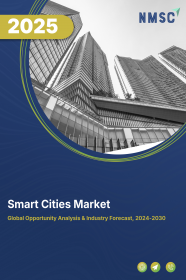
Smart Cities Market by Focus Area (Smart Transportation, Smart Buildings, and others), by Smart Transportation (Parking Management, and others), by Smart Buildings (Building Energy Optimization, and others), by Smart Utilities (Smart Energy Management, and others), by Smart Citizen Service (Smart Education, and others), by Component (Hardware, Software, and Services), and by End-User (Government & Municipalities, and others)– Global Opportunity Analysis and Industry Forecast 2020-2030
Market Definition:
The Global Smart Cities Market was valued at USD 392.9 billion in 2019 and is predicted to reach USD 1380.21 billion by 2030 with a CAGR of 12.1% from 2020-2030.
A smart city is the one that uses information and communication technology to increase operational efficiency of the city and improve both quality of government services and citizen welfare. The implementation of smart solution in different sectors such as healthcare, transportation and public services ensure a better and smarter way of living. Also, the growing need for smart housing solutions to accommodate surging population, controlling pollution and improving the economy are pushing the governments in many countries to implement various smart city projects.
Market Dynamics and Trends:
There has been an increasing need for better management of natural resources in order to ensure environmental sustainability. This, along with rising urbanization and numerous government initiatives for the improvement of digital infrastructure are factors driving the growth of smart cities market. Also, smart city ensures reliable water and electricity supply, effective waste management and efficient city operations such as traffic management and parking management with the help of advanced passenger information system. These advantages of smart city are also contributing towards the growth of smart cities market during the forecast period.
However, lack of robust telecom and networking infrastructure in developing countries, and absence of standardized regulatory frameworks are factors hampering the growth of the smart cities market to an extent. On the other hand, advancement in the field of Artificial Intelligence (AI) is expected to provide substantial growth opportunity for the smart cities market in the coming years.
Market Segmentations and Scope of the Study:
The global smart cities market is segmented on the basis of functional area and geography. On the basis of area of function, it is categorized into smart infrastructure, smart governance & smart education, smart energy, smart mobility, smart healthcare, smart buildings and others. Smart infrastructure is further sub-segmented into smart transportation, smart water management, smart stadium, smart public safety and security, smart lightning, and others. Smart energy is further sub-segmented into smart grid, power electronics, smart energy storage. Smart mobility is further sub-segmented into smart ticketing, smart parking and others. Smart healthcare is further sub-segmented into connected healthcare, telemedicine and others. Smart building is further sub-segmented into facility management systems, building safety and security, and others. Geographic breakdown and analysis of each of the aforesaid segments includes regions comprising of North America, Europe, Asia-Pacific, and RoW.
Geographical Analysis:
North America holds the lion share of the global smart cities market. This is attributed to the factors such as high demand for connected solutions, low energy consumption and implementation of internet of things (IoT).
However, Asia Pacific is expected to witness the highest growth rate during the forecast period due to growth in IT spending supported by various government initiatives in emerging economies such as China, Singapore, and South Korea. Also, rising demand for intelligent solutions for energy and infrastructure management are factors propelling the smart cities market growth in this region.
Competitive Landscape:
The global smart cities market report includes a comprehensive competitive analysis and profiles of major market players such as Alibaba Group Holding Limited, Amazon Web Services, Inc, Bosch.IO GmbH, Quantela, Inc., Cisco Systems, Inc., Ericsson, Fujitsu Limited, Fybr, Hitachi, Ltd., Huawei Technologies Co., Ltd., IBM Corporation, Intel Corporation, KaaIoT Technologies, Microsoft Corporation, NEC Corporation.
Key Benefits:
-
The global smart cities market report provides the quantitative analysis of the current market and estimations through 2020-2030 that assists in identifying the prevailing market opportunities to capitalize on.
-
The study comprises a deep dive analysis of the global smart cities market trend including the current and future trends for depicting the prevalent investment pockets in the market.
-
The information related to key drivers, restraints and opportunities and their impact on the global smart cities market is provided in the report.
-
The competitive analysis of the market players along with their market share in the global smart cities market
-
The SWOT analysis and Porters Five Forces model is elaborated in the study.
-
Value chain analysis in the market study provides a clear picture of the stakeholders’ roles.
Key Market Segments:
By Focus Area
-
Smart Transportation
-
Smart Buildings
-
Smart Utilities
-
Smart Citizen Services
By Smart Transportation
-
Parking Management
-
Traffic Management
-
Passenger Information Management
-
Freight Information Management
By Smart Buildings
-
Building Energy Optimization
-
Emergency Management
-
Parking Management
-
Water Management
By Smart Utilities
-
Smart Energy Management
-
Smart Grid Solutions
-
Water Treatment & Distribution
-
Waste Management
By Smart Citizen Service
-
Smart Education
-
Smart Healthcare
-
Smart Public Safety
-
Smart Street Lighting
By Component
- Hardware
-
IoT Sensors
-
Smart Meters
-
Surveillance Cameras
-
Others
-
-
Software
-
AI & Analytics Platform
-
Cloud-based City Management
-
Digital Twin Solutions
-
-
Services
-
Consulting
-
Managed Services
-
Others
-
By End-User
-
Government & Municipalities
-
Residential Sector
-
Commercial & Industrial
By Region
-
North America
-
The U.S.
-
Canada
-
Mexico
-
-
Europe
-
The UK
-
Germany
-
France
-
Italy
-
Spain
-
Denmark
-
Netherlands
-
Finland
-
Sweden
-
Norway
-
Russia
-
Rest of Europe
-
-
Asia-Pacific
-
China
-
Japan
-
India
-
South Korea
-
Australia
-
Indonesia
-
Singapore
-
Taiwan
-
Thailand
-
Rest of Asia-Pacific
-
-
RoW
-
Latin America
-
Middle East
-
Africa
-
Key Players:
-
Alibaba Group Holding Limited
-
Amazon Web Services, Inc
-
Bosch.IO GmbH
-
Quantela, Inc.
-
Cisco Systems, Inc.
-
Ericsson
-
Fujitsu Limited
-
Fybr
-
Hitachi, Ltd.
-
Huawei Technologies Co., Ltd.
-
IBM Corporation
-
Intel Corporation
-
KaaIoT Technologies
-
Microsoft Corporation
-
NEC Corporation
REPORT SCOPE AND SEGMENTATION:
|
Parameters |
Details |
|
Analysis Period |
2019–2030 |
|
Base Year Considered |
2020 |
|
Forecast Period |
2020–2030 |
|
Market Size Estimation |
Billion (USD) |
|
Market Segmentation |
by Functional Area (Smart Infrastructure, Smart Governance and Smart Education, Smart Energy, Smart Mobility, Smart Healthcare, Smart Building) |
|
Geographical Segmentation |
North America (U.S., Canada, Mexico) Europe (UK, Germany, Italy, Spain, Rest of Europe), Asia-Pacific (China, Japan, Korea, Singapore, Rest of APAC), Rest of the World (Latin America, Middle East, Africa) |
|
Companies Profiled |
AT&T Inc., Cisco Systems Inc., Ericsson, General Electric, Hitachi Ltd, Huawei Technologies Co., IBM Corporation, Intel corporation, Microsoft Corporation, and Schneider Electric SE. |




















 Speak to Our Analyst
Speak to Our Analyst

























